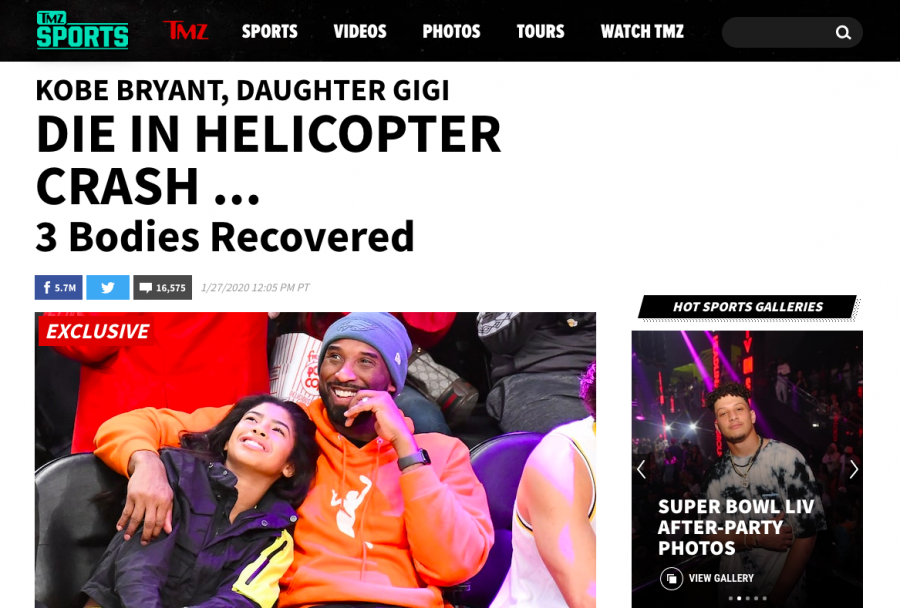Journalism requires sensitivity in tragic events
TMZ shouldn’t have broken the news of Kobe Bryant’s death before his family was notified
TMZ broke the news of Bryant’s death before his family was notified.
February 4, 2020
Just like they do dozens of other times every day, people around the world checked their phones Jan. 26 at 2:32 pm. But what they saw this time was different: a notification from TMZ with the headline, “BREAKING: Kobe Bryant Has Died In A Helicopter Crash.”
TMZ was the first media outlet to break the story. Though sharing information as quickly as possible may be journalistically ethical in other circumstances, TMZ made what many people — including myself — believe is a blundering error: they released the information before Bryant’s family had been notified of his death, according to the Los Angeles County Police.
Shock, sadness, anger and denial were a mere few of the emotions that fans and players felt and expressed on social media. But just think, how would have a friend of Bryant’s felt seeing that article? How would a family member have felt? What about a parent or friend who knew the other people on the helicopter? What about a mother and wife who realized she may have just lost her daughter and husband?
Obviously, nobody can truly put themselves in the shoes of a family member or close friend of Bryant. Yet, just thinking about what that might have been like for those people to read that message makes many sick to their stomachs.
As journalism’s online presence grows, the race to break stories has heightened. More competition among news sources means that sometimes, we ignore ethics in favor of “winning” what shouldn’t even be a competition. The way in which TMZ handled Bryant’s death should be a wake-up call for journalists to why they shouldn’t sacrifice human decency for a news story.
There’s an issue with the one-track mindset of being the first to report: it leads to errors and disingenuous reporting. Shortly after TMZ published the article, an ABC correspondent reported that all four of Bryant’s daughters were killed in the crash. After the Boston Marathon Bombing in 2013, the New York Post reported that 12 people had died and a Saudi Arabian was in custody, both of which were false. In 2017, a video of a woman who had recently been rescued from Hurricane Harvey getting outraged at a CNN reporter for being insensitive toward the tragedy went viral.
Events like these are a part of why so many people have begun to feel distrust and disgust toward the media in recent years. In fact, many people initially thought that the news about Bryant’s death was false because of these strong negative attitudes toward the media. This widespread doubt made the eventual confirmation from respected new outlets even more brutal and heartbreaking for those who were glued to their TVs and phones all day.
The coverage of Bryant’s death reflected the many problems with journalism today: people rapidly spreading misinformation on social media, insensitive reporting and scrambling for accuracy. But in the days following the tragedy, media outlets mourned Byant and featured the incredible output of support for him and the others who lost their lives. Hopefully, thanks to this sensitive and heartfelt reporting, we will be able to look back and remember the coming together of so many different people to honor Bryant and the helicopter crash victims instead of all the false information and chaos.
TMZ takes pride in their ability to be the first to break a story, but they — and many other news sources — treat the deaths of beloved public figures like big prizes to capitalize upon. Executives at TMZ argue that they want to inform the public as quickly as possible, but there’s a difference between informing the public and taking advantage of a tragedy.
The job of a journalist has always been to work for the public’s sake — more specifically, to inform and educate them. If journalists really work for the people, they should factor in how to be sensitive and respectfully handle situations instead of shoving cameras in celebrities’ faces for reactions.
TMZ should have waited for the police department to notify Bryant’s family about the crash before cashing in. Plus, TMZ is a wealthy and prominent news source; reporting this story just a few minutes later could have lessened the agony and shock of those close to Bryant without losing their click count. Journalism is a rapidly changing field, but that doesn’t mean our morals have to change with it.










